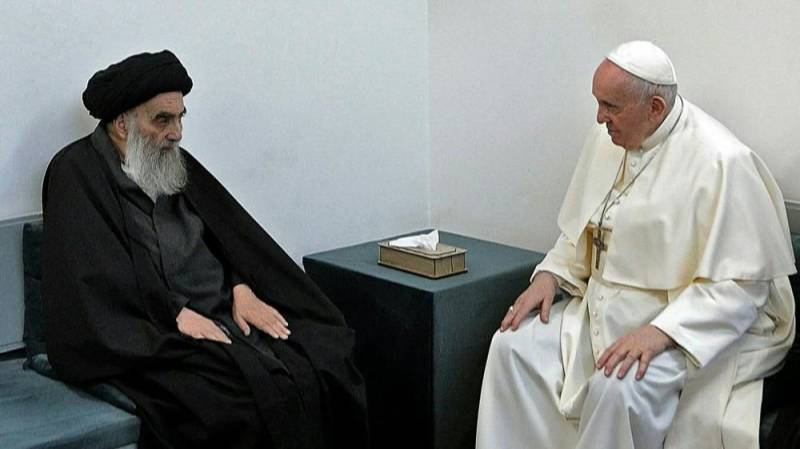Pope, top Shiite cleric plead for 'peace' in historic Iraq encounter

Stay tuned with 24 News HD Android App

Grand Ayatollah Ali Sistani, spiritual leader of most of the world's Shiite Muslims, told Pope Francis in a historic meeting in Iraq on Saturday that the country's Christians should live in "peace."
The meeting, on the second day of the first-ever papal visit to Iraq, marked a landmark moment in modern religious history and a milestone in Francis's efforts to deepen dialogue with other religions.
He later addressed the rich spectrum of Iraq's religious communities at Ur, traditional birthplace of the Prophet Abraham, a central figure in the Christian, Jewish and Muslim faiths, where he made an impassioned plea for "unity" after conflict.
The 84-year-old pontiff's trip to Iraq is an effort to both comfort the country's ancient but dwindling Christian community and deepen his dialogue with other faiths.
His meeting with the grand ayatollah lasted 50 minutes, with Sistani's office putting out a statement shortly afterwards thanking Francis for visiting the holy city of Najaf.
Sistani, 90, "affirmed his concern that Christian citizens should live like all Iraqis in peace and security, and with their full constitutional rights," it said.
His office published an image of the two, neither wearing masks: Sistani in a black turban with his wispy grey beard reaching down to his black robe and Francis all in white, looking directly at the grand ayatollah.
Sistani is extremely reclusive and rarely grants meetings but made an exception to host Francis, an outspoken proponent of interreligious dialogue.
The Pope had landed earlier at Najaf airport, where posters had been set up featuring a famous saying by Ali, the fourth caliph and the Prophet Mohammed's relative, who is buried in the holy city.
"People are of two kinds, either your brothers in faith or your equals in humanity," read the banners.
It all started here
Francis then headed straight to the desert site of the ancient city of Ur, where Abraham is believed to have been born in the second millenium BC.
"It all started from here," Pope Francis said, after hearing from representatives of Iraq's diverse religious communities.
There were Yazidis, whose ancestral heartland of Sinjar was ravaged by the Islamic State group in 2014, as well as Mandeans, Kakais, Bahais and Zoroastrians.
Shiite and Sunni sheikhs, as well as Christian clerics, were in attendance.
Each were wearing their traditional religious garb, with a dozen different types of robe and headdress on display in the red-carpeted pavilion set up for the visit.
Iraq is a Muslim-majority country of 40 million whose Christian population has shrunk in the last two decades to just one percent, with minorities still complaining of ostracism and persecution.
During his address, Pope Francis said freedom of conscience and of religion were "fundamental rights" that should be respected everywhere.
"We believers cannot be silent when terrorism abuses religion," Francis said, in a message of solidarity with the minorities persecuted under IS rule.
He also made an impassioned plea for "unity" after conflict.
"Let us ask for this in praying for the whole Middle East. Here I think especially of neighbouring war-torn Syria," he said.
Following the prayer service in Ur, Pope Francis is to head back to Baghdad to preside over a mass at the St. Joseph Cathedral.
Cease partisan interests
Pope Francis, a strong proponent of interfaith dialogue, has met top Sunni clerics in several Muslim-majority countries, including Bangladesh, Morocco, Turkey and the United Arab Emirates.
Sistani, meanwhile, is followed by most of the world's 200 million Shiites -- a minority among Muslims but the majority in Iraq -- and is a national figure for Iraqis.
In 2019, he stood with Iraqi protesters demanding better public services and rejecting external interference in Iraq's domestic affairs.
On Friday in Baghdad, Pope Francis made a similar plea.
"May partisan interests cease, those outside interests who don't take into account the local population," Francis said.
Sistani has had a complicated relationship with his birthplace Iran, where the other main seat of Shiite religious authority lies: Qom.
While Najaf affirms the separation of religion and politics, Qom believes the top cleric -- Iran's supreme leader Ayatollah Ali Khamenei -- should also govern.
Iraqi clerics and Christian leaders said the visit could strengthen Najaf's standing compared to Qom.
In Abu Dhabi in 2019, the Pope met Sheikh Ahmed al-Tayeb, the imam of the Al-Azhar mosque in Cairo and a key authority for Sunni Muslims.
They signed a text encouraging Christian-Muslim dialogue, which Catholic clerics hoped Sistani would also back, but the meeting passed without such an endorsement.
While the Pope has been vaccinated and encouraged others to get the jab, Sistani's office has not announced his vaccination.
Iraq is currently gripped by a resurgence of coronavirus cases, recording more than 5,000 infections and more than two dozen deaths daily.
